

Cloud Computing Zone Tests "Chongqing Model" In March 2011, the municipal government of Chongqing announced its intention to construct a special economic “cloud computing zone” (yun tequ), the largest such zone in Asia (Nanfang Zhoumo, June 16).
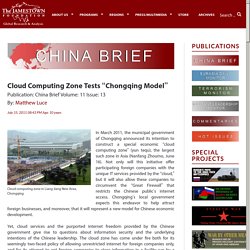
Not only will this initiative offer participating foreign companies with the unique IT services provided by the “cloud,” but it will also allow these companies to circumvent the “Great Firewall” that restricts the Chinese public’s internet access. Chongqing’s local government expects this endeavor to help attract foreign businesses, and moreover, that it will represent a new model for Chinese economic development. Yet, cloud services and the purported internet freedom provided by the Chinese government give rise to questions about information security and the underlying intentions of the Chinese leadership. China's Wukan village stands up for land rights. 15 December 2011Last updated at 15:56 By Martin Patience BBC News, Wukan, Guangdong province Many protesters say they will continue to make a stand, despite government concessions At first light, the sound of mourning music could be heard across the rooftops.
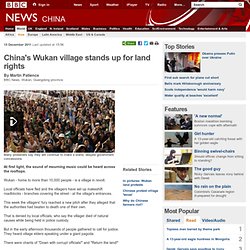
Wukan - home to more than 10,000 people - is a village in revolt. Local officials have fled and the villagers have set up makeshift roadblocks - branches covering the street - at the village's entrances. This week the villagers' fury reached a new pitch after they alleged that the authorities had beaten to death one of their own. That is denied by local officials, who say the villager died of natural causes while being held in police custody. But in the early afternoon thousands of people gathered to call for justice. Banned in China by Jonathan Mirsky. In late December, a foreign correspondent in Beijing emailed me to say that a four-page article on China I’d written for a special New Year’s edition of Newsweek had been carefully torn from each of the 731 copies of the magazine on sale in China.
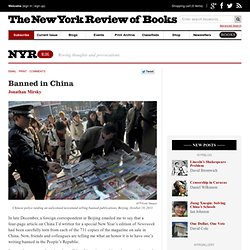
Now, friends and colleagues are telling me what an honor it is to have one’s writing banned in the People’s Republic. In over forty years of writing about China, I have been subjected to many forms of pressure. But this has never happened to me. What had I said this time that attracted the attention of the official shredder? Then I learned that a few months earlier, on August 28, 2011, Ai Weiwei had also published a piece in Newsweek that the Chinese censors cut out.
They see you or they don’t see you, it doesn’t make the slightest difference. Countering the Contagious West - Mohamed A. El-Erian. Exit from comment view mode.

Click to hide this space NEWPORT BEACH – Imagine for a moment that you are the chief policymaker in a successful emerging-market country. You are watching with legitimate concern (and a mixture of astonishment and anger) as Europe’s crippling debt crisis spreads and America’s dysfunctional politics leave it unable to revive its moribund economy. Would you draw comfort from your country’s impressive internal resilience and offset the deflationary winds blowing from the West; or would you play it safe and increase your country’s precautionary reserves?
That is the question facing several emerging-market economies, and its impact extends well beyond their borders. The very fact that we are posing this question is novel and notable it its own right. The answer to the emerging markets’ question would have been straightforward a few years ago. In the process, they would shift some of the policy emphasis from production to consumption. Is Meritocracy Good? Notes on the Rise of China - Anne-Marie Slaughter - International. Patrick Chovanec. Three Videos About China - James Fallows - International. Or, two videos and an interesting photo. 1) This is why I love China: a video of a young woman who finds an innovative answer to the parking problems engendered by the nonstop increase in the number of cars.
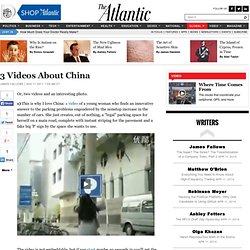
She just creates, out of nothing, a "legal" parking space for herself on a main road, complete with instant striping for the pavement and a fake big 'P' sign by the space she wants to use. The video is not embeddable, but if you start maybe 40 seconds in you'll get the idea, and probably want to watch for another minute or two. China's Second And Third Tier Cities Have Laws Too. : China Law Blog : China Law for Business. Since the inception of this blog, one of our recurring themes has been the need for foreign companies to follow China’s laws.
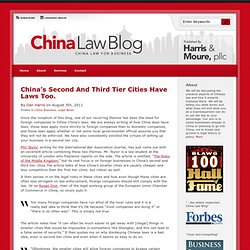
We are always writing of how China does have laws, those laws apply more strictly to foreign companies than to domestic companies, and those laws apply whether or not some local governmental official assures you that they will not be enforced. We have also consistently extolled the virtues of setting up your business in a second tier city. It then zeroes in on the legal risks in these cities and how even though these cities are often less stringent on law enforcement, foreign companies should still comply with the law. What's So Great About China? Observations based on my Trip to China. Sorry I was away so long.
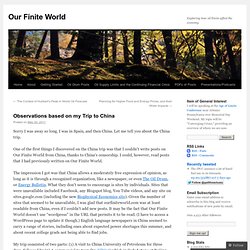
I was in Spain, and then China. Let me tell you about the China trip. One of the first things I discovered on the China trip was that I couldn’t write posts on Our Finite World from China, thanks to China’s censorship. I could, however, read posts that I had previously written on Our Finite World. The impression I got was that China allows a moderately free expression of opinion, as long as it is through a recognized organization, like a newspaper, or even The Oil Drum, or Energy Bulletin. China's Legal Exceptionalism Threatens International Integration.
China’s housing bubble: New evidence. For a while now, analysts have been arguing there is a bubble in China’s property market. Using records from 35 major cities this column finds evidence of a housing bubble. It compares house prices to cointegrated fundamentals and finds that property in China is in general overvalued by around 20% – and even more so in the boom towns.
For many observers, the Chinese economy has been spurred by a bubble in the real-estate market, probably driven by the fiscal stimulus package and massive credit expansion (Nicolas 2009). For example, the stock of loans increased by more than 50% since the end of 2008. In reaction to the global crisis, the government urged banks to increase lending (Cova et al. 2010). There are several indications that the market might have overheated in recent years. To dampen the evolution, the People’s Bank of China has increased its nominal interest rate. The end of cheap coal. World energy policy is gripped by a fallacy — the idea that coal is destined to stay cheap for decades to come. This assumption supports investment in ‘clean-coal’ technology and trumps serious efforts to increase energy conservation and develop alternative energy sources. It is an important enough assumption about our energy future that it demands closer examination.
China's Bumpy Road Ahead. No quick solution to China's power shortage. Guest Post: China is Different. Cross posted from MacroBusiness We need a new framework for understanding and interpreting what is happening in China.
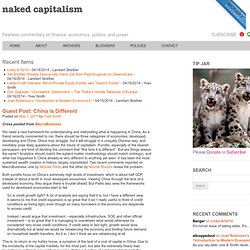
As a friend recently commented to me, there should be three categories of economies: developed, developing and China. China may struggle, but it will struggle in a uniquely Chinese way, and inevitably pose deep questions about the future of capitalism. Latest Census in China Triggers Fears of Demographic Decline - Wikistrat. Latest Census in China Triggers Fears of Demographic Decline Census details rapid aging of population and dramatic reduction of labor pipeline. Female fertility sits well below 2.0, triggering fears of Japan-like decline. One-child policy under attack, but government holds firm out of fear of resource requirements and social burden. Analysis. How China Could Yet Fail Like Japan. Japan’s gross domestic product per head (at purchasing power parity) jumped from a fifth of U.S. levels in 1950 to 90 percent in 1990.
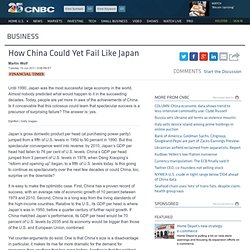
But this spectacular convergence went into reverse: by 2010, Japan’s GDP per head had fallen to 76 per cent of U.S. levels. China's Economy Faces Three Contradictions. Can China's style of rule continue in an age of citizen uprisings and social networking? - Asia, World. Modern members have come from far and wide on a pilgrimage to Xintiandi, which means "New heaven and earth".
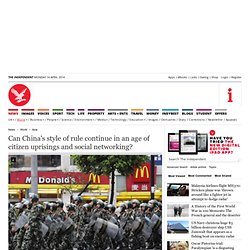
It's a decidedly non-proletarian environment – the Party people are sleek and confident; dressed in brand-name clothes and carrying the latest mobile phones; New China's elite. Xintiandi has a Covent Garden feel and most of the biggest Western brands are represented here. Pizza Express is crowded, Zara is full of shoppers and, at the local high-end T8 restaurant, tables are hard to find. Nestled in the former French Concession area of Shanghai, it's not where you'd expect the world's largest political party to have been born. The official version is that on 1 July, 1921, 13 Communists held their first national congress to mark the birth of the Party. Today, the Party has many reasons to celebrate. Beware China’s Political Bubble: Business Class. Cisco Poised to Help China Build Surveillance Project.